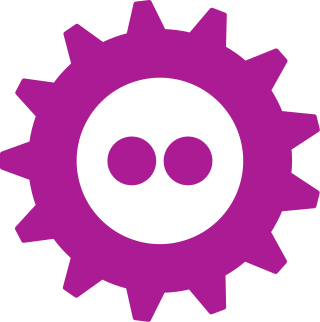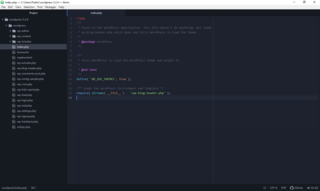Related Research Articles

Free and Open source Software Developers' European Meeting (FOSDEM) is a non-commercial, volunteer-organized European event centered on free and open-source software development. It is aimed at developers and anyone interested in the free and open-source software movement. It aims to enable developers to meet and to promote the awareness and use of free and open-source software.

Black Duck Open Hub, formerly Ohloh, is a website which provides a web services suite and online community platform that aims to index the open-source software development community. It was founded by former Microsoft managers Jason Allen and Scott Collison in 2004 and joined by the developer Robin Luckey. As of 15 January 2016, the site lists 669,601 open-source projects, 681,345 source control repositories, 3,848,524 contributors and 31,688,426,179 lines of code.
The following tables list notable software packages that are nominal IDEs; standalone tools such as source-code editors and GUI builders are not included. These IDEs are listed in alphabetic order of the supported language.

The Linux Foundation (LF) is a non-profit organization established in 2000 to support Linux development and open-source software projects. In addition to providing a neutral home where Linux kernel development can be fostered and accelerated, the LF is dedicated to building sustainable ecosystems around open-source projects to accelerate technology development and encourage commercial adoption.

GitHub, Inc. is a platform and cloud-based service for software development and version control, allowing developers to create, store and manage their code. It uses Git software, providing the distributed version control of Git plus access control, bug tracking, software feature requests, task management, continuous integration, and wikis for every project. Headquartered in California, it has been a subsidiary of Microsoft since 2018.
The open-source-software movement is a movement that supports the use of open-source licenses for some or all software, as part of the broader notion of open collaboration. The open-source movement was started to spread the concept/idea of open-source software.

Cloud Foundry is an open source, multi-cloud application platform as a service (PaaS) governed by the Cloud Foundry Foundation, a 501(c)(6) organization.
The O'Reilly Open Source Award is presented to individuals for dedication, innovation, leadership and outstanding contribution to open source. From 2005 to 2009 the award was known as the Google–O'Reilly Open Source Award but since 2010 the awards have only carried the O'Reilly name.
The Ada Initiative was a non-profit organization that sought to increase women's participation in the free culture movement, open source technology and open culture. The organization was founded in 2011 by Linux kernel developer and open source advocate Valerie Aurora and open source developer and advocate Mary Gardiner. It was named after Ada Lovelace, who is often celebrated as the world's first computer programmer, as is the Ada programming language. In August 2015, the Ada Initiative board announced that the organization would shut down in October 2015. According to the announcement, the Initiative's executive leadership decided to step down, and the organization was unable to find acceptable replacement leaders.

Thomas Preston-Werner is an American billionaire software developer and entrepreneur. He is an active contributor within the free and open-source software community, most prominently in the San Francisco Bay Area, where he lives.

Atom was a free and open-source text and source code editor for macOS, Linux, and Windows with support for plug-ins written in JavaScript, and embedded Git Control. Developed by GitHub, Atom was released on June 25, 2015.

Outreachy (previously the Free and Open Source Software Outreach Program for Women) is a program that organizes three-month paid internships with free and open-source software projects for people who are typically underrepresented in those projects. The program is organized by the Software Freedom Conservancy and was formerly organized by The GNOME Project and the GNOME Foundation.

GitLab Inc. is an open-core company that operates GitLab, a DevOps software package that can develop, secure, and operate software. The open source software project was created by Ukrainian developer Dmytro Zaporozhets and Dutch developer Sytse Sijbrandij. In 2018, GitLab Inc. was considered to be the first partly-Ukrainian unicorn.
RethinkDB is a free and open-source, distributed document-oriented database originally created by the company of the same name. The database stores JSON documents with dynamic schemas, and is designed to facilitate pushing real-time updates for query results to applications. Initially seed funded by Y Combinator in June 2009, the company announced in October 2016 that it had been unable to build a sustainable business and its products would in future be entirely open-sourced without commercial support.

Coraline Ada Ehmke is an American software developer, open source advocate, and Founder and Executive Director of the Organization for Ethical Source, based in Chicago, Illinois. She began her career as a web developer in 1994 and has worked in a variety of industries, including engineering, consulting, education, advertising, healthcare, and software development infrastructure. She is known for her work in Ruby, and in 2016 earned the Ruby Hero award at RailsConf, a conference for Ruby on Rails developers. She is also known for her social justice work and activism, writing the Contributor Covenant and Post-Meritocracy Manifesto, and promoting the widespread adoption of codes of conduct for open source projects and communities.
This is a timeline of GitHub, a web-based Git or version control repository and Internet hosting service.

The open-source-software movement is commonly cited to have a diversity problem. In some ways it reflects that of the general gender disparity in computing, but in general is assumed to be even more severe. The same can be extended to the racial and ethnic diversity of the movement. "Diversity" in this article uses the academic Critical Theory definition.
Sage Sharp is a software engineer who has worked on the Linux kernel, including serving on the Linux Foundation's Technical Advisory Board for two years.
Mattermost is an open-source, self-hostable online chat service with file sharing, search, and integrations. It is designed as an internal chat for organisations and companies, and mostly markets itself as an open-source alternative to Slack and Microsoft Teams.
Microsoft, a technology company historically known for its opposition to the open source software paradigm, turned to embrace the approach in the 2010s. From the 1970s through 2000s under CEOs Bill Gates and Steve Ballmer, Microsoft viewed the community creation and sharing of communal code, later to be known as free and open source software, as a threat to its business, and both executives spoke negatively against it. In the 2010s, as the industry turned towards cloud, embedded, and mobile computing—technologies powered by open source advances—CEO Satya Nadella led Microsoft towards open source adoption although Microsoft's traditional Windows business continued to grow throughout this period generating revenues of 26.8 billion in the third quarter of 2018, while Microsoft's Azure cloud revenues nearly doubled.
References
- ↑ "Your Code of Conduct". Open Source Guides. Retrieved 6 October 2021.
- ↑ "Contributor Covenant: A Code of Conduct for Open Source Projects". Contributor Covenant. Retrieved July 6, 2017.
- ↑ Evans, Jon (March 5, 2016). "On the war between hacker culture and codes of conduct". TechCrunch. Retrieved July 6, 2017.
- ↑ Bostick, Chad (November 4, 2016). "GitHub's Anti-Harassment Tools and the Open Source Codes of Conduct". Hello Tech Pros. Retrieved July 6, 2017.
- 1 2 Finley, Klint (September 26, 2018). "The Woman Bringing Civility to Open Source". Wired.
- ↑ "Code of Conduct – opensource.google.com". opensource.google.com. Retrieved 2018-05-26.
- ↑ "Contributor Covenant: Adopters". Contributor-covenant.org. Retrieved 2018-05-26.
- ↑ "Contributor Covenant: A Code of Conduct for Open Source Projects". www.contributor-covenant.org.
- ↑ "2016 Ruby Heroes". Ruby Heroes. Archived from the original on June 10, 2017. Retrieved July 6, 2017.
- ↑ RailsConf (May 12, 2016). Ruby Hero Awards (Videotape). Confreaks. 3:52 minutes in.
- ↑ "Linux Has a Code of Conduct and Not Everyone is Happy With it". 19 September 2018.
- ↑ Lardinois, Frederic (27 May 2021). "The open-source Contributor Covenant is now managed by the Organization for Ethical Source". TechCrunch. Retrieved 6 October 2021.